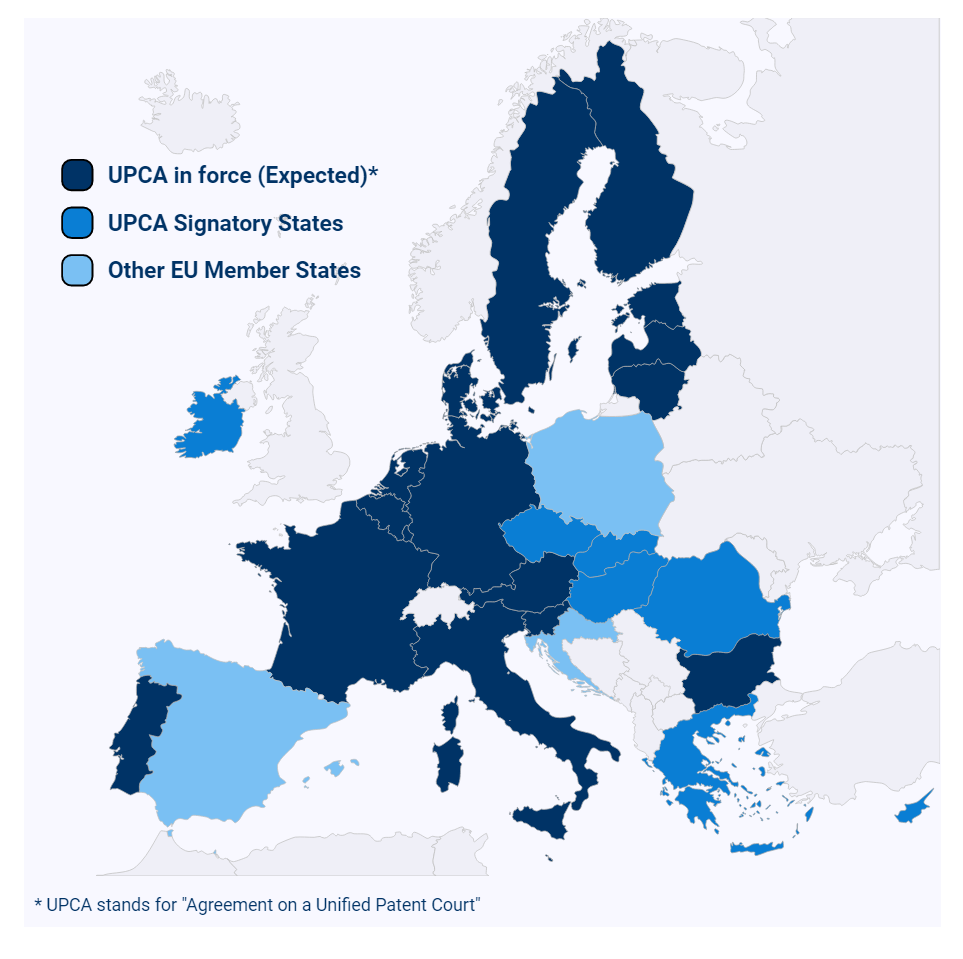A New Patent System is Born in Europe
What You Need to Know
Key takeaway #1
Obtaining a Unitary Patent that covers 17 European countries is possible as of June 1, 2023.
Key takeaway #2
Enforcement and revocation proceedings regarding a Unitary Patent are to be handled exclusively by a single Unified Patent Court (UPC) as of June 1, 2023.
Key takeaway #3
For a seven-year transition period starting on June 1, 2023, the UPC will have parallel jurisdiction with national courts for traditional European Patent Office patents validated in any of the 17 member European countries that have ratified the UPC. Owners of such patents can opt out of granting parallel jurisdiction to the UPC.
Client Alert | 18 min read | 06.22.23
I. Introduction
Unitary Patents are being granted and the Unified Patent Court is up and running as of June 1, 2023. Since the 1970’s, there have been attempts at establishing a unitary European patent that would cover multiple European countries and would be enforced by a single court system. This type of system is in contrast to the system known since 1973 of granting European Patents by the European Patent Office (EPO) and validating the European Patent in designated European countries, wherein each validated patent is enforced in the national court associated with the validated patent.
Failure to agree on the language(s) of such a European Patent has prevented the establishment of a Unitary Patent until recently. On January 19, 2022, Austria ratified a Protocol that started up the process for establishing a Unitary Patent and a Unified Patent Court (UPC) in Europe. When Germany ratified the Protocol on February 17, 2023, that set the date for the granting of Unitary Patents and the beginning of operation of the UPC as June 1, 2023. Currently, the Unitary Patent and the UPC have been ratified by seventeen countries: Austria, Belgium, Bulgaria, Denmark, Estonia, Finland, France, Germany, Italy, Latvia, Lithuania, Luxembourg, Malta, the Netherlands, Portugal, Slovenia, and Sweden. A map available at the UPC’s website www.unified-patent-court.org is given below wherein current ratifying countries are given in dark blue.

Only countries that are members of the European Union are eligible (accordingly, the United Kingdom is not eligible and, thus, denoted in gray above) for ratifying the Unitary Patent and Unified Patent Court system. Of the ten remaining members of the European Union, Poland, Spain, and Croatia (light blue in the map) have indicated they will either not ratify or wait and see in its decision to ratify. There is belief that the remaining countries (denoted in medium blue above) Cypress, the Czech Republic, Greece, Hungary, Ireland, Romania, and Slovakia will eventually ratify.
II. Unitary Patent
The first Unitary Patents were granted on June 12, 2023. Pursuant to the records of the European Patent Office, 105 Unitary Patents were granted on June 12th. As with all Unitary Patents, these Unitary Patents were based on a European Patent granted by the EPO and there were no government fees associated with obtaining the Unitary Patent. Assuming all annuities are paid, the Unitary Patents will have a term of 20 years from the filing of their corresponding EPO patent applications. The consensus view is there will be savings regarding payments of annuities for a Unitary Patent when compared to the situation of the European patent being validated in four or more Unitary Patent member countries.
While there are no requirements for working of the invention by the patentee, compulsory licenses may be granted under certain conditions per the laws of the individual Unitary Patent member countries. However, the granting of compulsory licenses under any circumstances is very rare in the group of Unitary Patent member countries. National courts grant compulsory licenses and not the Unified Patent Court.
III. Unified Patent Court
A. Exclusive Jurisdiction and Structure of the Court
The UPC has exclusive jurisdiction over Unitary Patents regarding such issues as revocation and infringement. The UPC has a Court of First Instance at which actions of revocation and infringement are first brought. The Court of First Instance currently has a Central Division, 13 local divisions, and a regional division. While each member country is guaranteed the right to have at least one local division, Bulgaria, Luxembourg, and Malta have decided that actions that could have been brought in their countries will be decided by the Central Division. Germany is the only country that has multiple local divisions due to the number of EPO patent cases previously heard in Germany. Germany has four local divisions, the maximum allowed. The regional division covers the countries of Estonia, Latvia, Lithuania, and Sweden, where the seat of the regional division is based in Stockholm, Sweden, and places of hearing are based in the other three countries of the region.
The Central Division is presently located in Paris and Munich. The main function of the Central Division is to adjudicate revocation and non-infringement proceedings. The Munich branch handles cases related to patents regarding International Patent Classifications C and F regarding Chemistry and Mechanical Engineering, respectively. The Paris branch handles cases involving patents in International Patent Classification A related to human necessities (which includes pharmaceuticals) and any other classifications of patents not handled by Munich. There has been much speculation whether a third branch will be established to handle cases in International Patent Classifications A and C. Prior to Brexit, the plan was to have the third branch in London. Today, Milan is being discussed as a possible location for the third branch.
Actions filed with the Court of First Instance are subject to an accelerated time line, wherein court proceedings and a court decision are to be completed within a year of the initial filing. Extensions of time are to be rarely granted. Based on such tight time constraints, plaintiffs should have an advantage over defendants due to their pre-filing preparations.
Decisions of the Court of First Instance can be appealed to a Court of Appeal based in Luxembourg. In addition, either the Court of First Instance or the Court of Appeal can file a Request for Preliminary Ruling on Questions on European Union law with the Court of Justice of the European Union (CJEU). The possibility of a party being bound by a decision of the CJEU, a European Union entity, was a main reason that the United Kingdom decided not to participate in the Unitary Patent/UPC system.
Parties can be represented before the UPC by the following individuals:
1) lawyers authorized to practice before the courts of a country that has ratified the UPC, wherein such lawyers have attained a bachelor or masters degree in law; or
2) European Patent Attorneys entitled to act as professional representatives before the European Patent Office and have appropriate qualifications, such as a European Patent Litigation Certificate (EPLC). During a one-year transition period starting on June 1, 2023, the appropriate qualifications can be met by attaining 13 certificates listed in Rule 12 of the EPLC Rules.
B. Parallel Jurisdiction with National Courts
Besides having exclusive jurisdiction of disputes regarding Unitary Patents, the UPC has parallel jurisdiction of each European Patent granted by the EPO that is validated in a country that has ratified the Protocol mentioned previously. Such parallel jurisdiction will exist during a transitional phase that lasts until June 1, 2030, wherein the term of the transitional phase may be extended by an additional seven years. At the end of the term of the transitional phase, the UPC will have exclusive jurisdiction over the validated patents mentioned previously.
Parallel jurisdiction will have interesting consequences. For example, there could be instances where a validated patent is the subject of an infringement action before the UPC and the same patent is the subject of a revocation action in the corresponding national court. Another interesting example is where a party files a non-infringement action regarding a validated patent in a national court of a country that has not ratified the Unitary Patent and the UPC, and the owner of a corresponding European patent validated in a country that has ratified the Unitary Patent and the UPC files for a preliminary injunction against the party in the UPC. It is envisioned that such parallel proceedings will be the subject of litigation as to whether such parallel proceedings are permissible in general and, if permissible, under what circumstances.
The first validated European patent that is the subject of a revocation action filed before the Central Division regards EP 3666797 entitled “Antigen Binding Proteins to Proprotein Convertase Subtilisin Kexin Type 9 (PCSK9)” and assigned to Amgen, Inc. The action was filed on June 2, 2023 and the proceedings will be in English. Similarly, the first validated European patent that is the subject of an infringement action filed before a local division of the Court of First Instance regards EP 3375337 entitled “Sanitation Bath Tub Device” and assigned to Kaldewei GmbH & Co. KG Franz. The action was filed on June 2, 2023 and the proceedings will be in German.
If the owner of a validated patent wishes to avoid having that patent be subject to the jurisdiction of the UPC, the owner can file papers with the EPO to opt-out of such jurisdiction any time during the transitional phase. There is no government fee associated with opting out. Filing to opt-out will be effective if no previous action associated with the patent has been filed with the UPC. Opting out is effective until the validated patent expires. After opting out, papers can be filed to opt back in to jurisdiction of the UPC. After opting in, the patent owner will not be allowed to opt out again.
IV. Conclusion
The recent institution of the Unitary Patent and Unified Patent Court in Europe presents many questions for European patent and patent application owners. Do I obtain a Unitary Patent? Do I opt-out of the jurisdiction of the UPC? How do I effectively litigate patent issues in Europe? There are attorneys at Crowell that can find answers to your questions regarding the Unitary Patent and the Unified Patent Court.
Contacts
Insights
Client Alert | 3 min read | 03.02.26
Clinical trial sponsors and all other stakeholders involved in conducting commercial clinical trials of investigational medicinal products (IMP) in the UK.
Client Alert | 4 min read | 03.02.26
Client Alert | 3 min read | 02.27.26
Client Alert | 6 min read | 02.27.26




